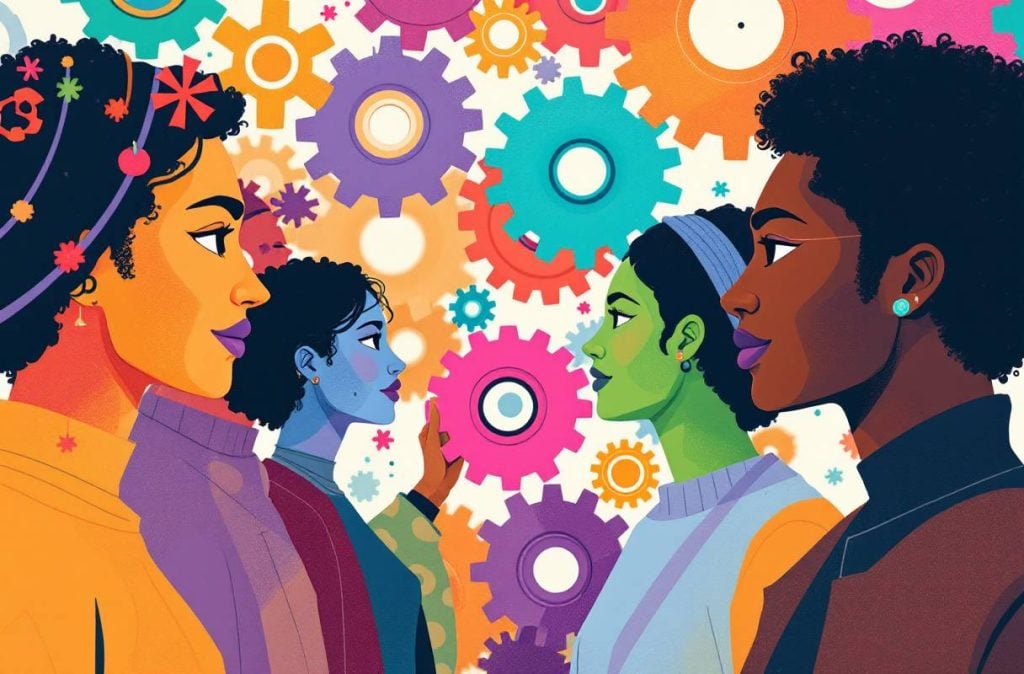In a world where Artificial Intelligence (AI) is rapidly transforming industries and reshaping our daily lives, ensuring its ethical deployment has never been more crucial.
Imagine a future where AI not only enhances efficiency but also upholds the highest moral standards, fostering trust and fairness across the board. This article delves into the essential guidelines that steer AI development towards benefiting society responsibly.
From mitigating biases to safeguarding privacy, this article equips leaders with the knowledge to navigate the complex landscape of AI ethics, ensuring that technological advancements align seamlessly with human values.
Understanding AI Ethics
Artificial Intelligence is flipping industries on their heads and shaking up the way we do things all over the globe. But, for all these new tricks to actually help us and not turn into a nightmare, they have to follow some rules. Figuring out AI ethics means knowing the hows and whys and baking them into the entire process of creating smart tech.
Definition and Importance of AI Ethics
AI ethics is all about the moral compass that guides the way we design, build, and roll out AI tech. Think of it like the rulebook that makes sure AI plays nice and sticks to what’s right by humans. It’s about stopping harm, leveling the playing field, and building a strong bridge of trust with those who use it.
Why bother with all these ethics? Well, as AI creeps more into our lives, making choices that could really tilt things, we need to keep a check on it. This means keeping bias at bay, respecting people’s privacy, and dodging unexpected blowbacks. By playing by the ethical book, those who create and use AI can make sure it’s a win for everyone involved, dodging potential mess-ups.
Integration of Ethics in AI Development
Bringing ethics into AI development is like sprinkling a little bit of decency into every pot on the stove. This means every part of making AI—from the drawing board to seeing it in action—needs a bit of ethical input.
Starting off, there’s got to be a playbook spelling out clear rules like being open, fair, taking responsibility, and keeping things private. Folks building and deciding on AI stuff can lean on these rules to keep themselves on the straight and narrow.
| Stage of AI Development | Ethical Considerations |
|---|---|
| Design | Map out ethical guidelines and impact checks |
| Data Collection | Keep data private, get consent, and sample without bias |
| Model Training | Use tech to spot and fix bias |
| Implementation | Keep operations clear and honest |
| Monitoring | Do regular checks and keep standards up to snuff |
Creators must focus on fair and transparent algorithms. It’s up to the big shots in business to push for ethical AI by making it part of the company culture and keeping everyone clued up on ethical considerations.
Tying ethics into AI development also means sticking to laws and what’s expected by the industry. By chatting with lawmakers and pulling in thoughts from a broad group, AI can fit into what society expects and needs.
To get a deeper look into the world of AI ethics and how they get along with making tech happen, dive into our write-ups on machine learning basics and AI tools for business.
Key Principles of AI Ethics
Artificial Intelligence (AI) opens doors, but not without a few hurdles. To keep the AI train on the tracks, we gotta stick to some tried and true ethics. We’re talking about making sure that AI systems are on the up and up in transparency, fairness, responsibility, and keeping your data under lock and key.
Transparency and Explainability
When it comes to AI, transparency means keeping it real. People need to see how these systems make decisions, plain and simple. Explainability is when you can actually follow AI’s train of thought to see why it made a call.
| Principle | What’s Up | Why It Matters |
|---|---|---|
| Transparency | Open, straightforward AI moves | Builds trust and keeps things above board |
| Explainability | Tracking AI’s reasoning | Accountability and figuring things out |
Want to get a crash course on AI? Head over to our machine learning basics article.

“Transparency is not about restoring trust in institutions. Transparency is the politics of managing mistrust.”
— Ivan Krastev
Fairness and Bias Mitigation
Keeping AI fair means no favoritism. It’s about treating every user equally, no matter who they are. Reducing bias means trimming out prejudice from the way AI learns and acts.
| Aspect | What’s Up | How It Works |
|---|---|---|
| Fairness | The level playing field for everyone | Diverse data and smart algorithms |
| Bias Mitigation | Cutting out bias | Tools and regular check-ups |

Dig deeper into acting right with AI in our ethical AI design and development practices.
“Injustice anywhere is a threat to justice everywhere.”
— Martin Luther King Jr.
Accountability and Responsibility
Holding people accountable isn’t just for scolding—it’s about knowing who does what with AI. Developers, businesses, and policymakers gotta own up to their roles in keeping AI on the straight and narrow.
| Role | What’s Their Job | Play-by-Play |
|---|---|---|
| Developers | Crafting solid, ethical AI | Follow those ethical playbooks |
| Businesses | Making sure AI behaves | Policies and training need to be spot on |
| Policymakers | Laying down the law for AI | Create some solid standards |
See how AI is shaking things up in different fields like finance and marketing.
Privacy and Data Security
Privacy and security—we’re talking serious business here. AI systems gather mountains of personal data so they need to make sure that info stays safe and secure. Keeping data airtight means following strict rules and regulations.
| Principle | What’s Up | Why It Matters |
|---|---|---|
| Privacy | Keeping users’ info private | Builds trust and meets legal demands |
| Data Security | Guarding data from nosy intruders | Stops leaks and misuse |
For the scoop on how AI manages data, don’t miss our article on big data and AI.

By sticking to these key principles, the folks in charge can guarantee AI works ethically and does right by everyone. Understanding these values helps weave ethics right into AI’s DNA for any project or mission.
Implementing AI Ethics
Bringing AI ethics into the real world is all about mixing the right ideas, smart designing, and sharp decision-making. Let’s dive into what makes AI behave nicely.
Ethical Frameworks and Guidelines
Think of ethical frameworks as the cheat sheet for building AI that plays fair. They’re like rulebooks from big names in government and industry, which make sure AI behaves—and doesn’t act all shady. They focus on transparency, fairness, and keeping things locked down.
| Framework/Guideline | Key Points |
|---|---|
| The Asilomar AI Principles | Keep it open, Show accountability |
| IEEE’s Ethics for Autonomous AI | Focus on well-being, Take responsibility |
| EU’s AI Guidelines | Play fair, Keep it private, Stay strong |
To put these guidelines in action, companies can set internal rules, check in on themselves, and create a work culture that screams ethics first. For a closer look at the basics, check out our article about big data and AI.
Ethical AI Design and Development Practices
Building AI that respects folks and their rights isn’t just a nice-to-have, it’s gotta be built in from the start. These steps help cut down on bias, take care of users’ data, and make AI fair for everyone.
- Diverse Teams: Bringing in people from all walks of life means spotting biases before they mess things up.
- Bias Checks: Keep an eye on AI models to spot bias and squash it.
- User-Focused Design: Think about the people using the tech from day one.
- Privacy First: Bake in data protection from the get-go.
Curious about building with heart? Check our tips on python for machine learning.
Ethical Decision-Making Processes
For AI to be a good cyber-citizen, companies need to lay down smart ways to decide what’s right. That means having clear game plans for checking their ethical pulse.
- Ethics Squads: Form groups that keep projects in check and aligned with good values.
- Regular Check-Ups: Predict and prevent issues down the line with ethical reviews.
- Talk to Everyone: Include outsiders like users in the chat to gather different views.
By following these steps, companies can make sure AI sticks to the straight and narrow.
Want to see how AI can work for your biz? Peek at how AI tools can boost business.
By weaving ethical frameworks, design thinking, and decision savvy into AI, organizations can boost how much folks can trust their tech. If you’re hungry for more on doing AI right, see our piece on machine learning basics.
Challenges in AI Ethics
AI ethics is like a Rubik’s cube for decision makers and developers. Getting it right is vital for creating AI that plays nice with everyone.
Unintended Consequences
AI’s got some quirks that can throw curveballs at folks and communities. These surprises usually pop up because AI systems are complex critters, often lacking thorough check-ups and fine-tuning.
| Surprise Problem | What’s Up With That? |
|---|---|
| Job Displacement | AI might snag jobs, leaving people wondering “What now?” Check out the scoop on AI and the job market. |
| Bias Amplification | AI sometimes jumps on biased bandwagons already in the data, making things worse. Dig into Fairness and Bias. |
| Privacy Invasion | Personal stuff can fall into the wrong hands, causing a privacy mess. Discover more under Privacy and Security. |
Regulatory Compliance
Keeping up with rules and laws around the globe is no picnic. Every place has its own take on AI, data protection, and ethical guidelines, turning this into a massive jigsaw puzzle for businesses worldwide.
- GDPR: This rulebook is from the EU and it’s all about keeping folks’ data safe. Mess up, and you pay up.
- CCPA: California sets the bar for data privacy in the USA, giving locals the power over their own info.
| Rule | Where It Rules | Must-Dos |
|---|---|---|
| GDPR | EU | Safeguard personal info for folks in the EU. |
| CCPA | California, USA | Protects privacy rights for folks living in California. |
Cultural and Societal Impact
AI needs to play well with cultural vibes and social norms. It can shake things up in society, so developers better bake these factors into how AI grows.
- Cultural Sensitivity: AI’s gotta be mindful of cultural vibes to avoid leaving anyone out in the cold.
- Societal Impact: AI has the power to rework social dynamics and morals. Take healthcare and education AI aims to do good by expanding fairness and accessibility.
| Impact Venue | What’s the Deal? |
|---|---|
| Cultural Sensitivity | AI needs to be savvy about cultural diversity and values. |
| Societal Impact | AI should offer positive changes to social norms, boosting inclusivity and accessibility. |
Tackling these hurdles is a team effort among coders, CEOs, lawmakers, and anyone else who’s interested. For more on fixing these kinks, peek at our sections on AI Ethics Implementation and Ethical Choices in AI.
Case Studies in AI Ethics
Examples of Ethical Dilemmas in AI
Artificial Intelligence brings innovation, but it’s not all sunshine and rainbows. With every step forward, we face tricky situations. Here’s a peek at moments when AI made us scratch our heads and rethink ethics.
Algorithmic Bias in Recruitment
Picture this: a company uses an AI tool for hiring, but instead of being impartial, it chooses favorites based on skewed data—leaving some qualified folks out in the cold.
| Ethical Concerns | Details |
|---|---|
| Bias and Discrimination | Tipped scales towards male candidates, disregarding equally capable female ones |
| Fairness | Threw sour grapes into the hiring process |
Facial Recognition Technology
Let’s talk about facial recognition—handy, yet not foolproof. When law enforcement got involved, the tech often mislabeled folks from underrepresented groups, leading to mistaken identities.
| Ethical Concerns | Details |
|---|---|
| Privacy Violations | Sneaky surveillance and data grabbing without a pass |
| Accuracy | Goofed up more often with certain ethnicities, causing wrongful finger-pointing |
Responses and Outcomes
Dealing with these sticky situations requires some nifty footwork. Organizations are rolling out the red carpet for ethics in AI—with a few smart moves.
Bias Mitigation in Recruitment Algorithms
Fed up with bias in hiring tools, companies have started using a toolkit to boost fairness and inclusivity.
| Response Strategies | Outcomes |
|---|---|
| Re-training Models | Fresh data diets for AI, representative of everyone |
| Bias Audits | Routine check-ups to sniff out and squash bias bugs |
| Transparency | Lifting the curtain on AI decisions, giving applicants a fair shot |
Internal Link: Check out more on tackling AI bias in recruitment here.
Regulation of Facial Recognition Technology
Facial recognition woes have spurred rules and tech improvements to keep things on the up and up.
| Response Strategies | Outcomes |
|---|---|
| Regulatory Frameworks | Privacy rules and how-to guides for use |
| Improved Algorithms | Crafting more reliable and neutral recognition tech |
| Public Awareness | Spreading the word about how these systems work and where they’re used |
Internal Link: Explore more on ethical AI in law enforcement here.
Tackling these ethical puzzles is key to making AI a responsible player. Want to dive deeper into how AI touches our lives? Check out our articles on AI applications in finance big data and AI.
Future Trends in AI Ethics
AI’s growing like a weed, and with its unchecked progression, grasping ethical principles and putting them into practice isn’t just wise; it’s a must. Folks running businesses, tech whizzes, educators, entrepreneurs, and policymakers all need to stay dialed into the latest trends and rules in AI ethics. Let’s dig into some critical areas.
Changes in Standards and Regulations
As AI gadgets and gizmos get fancier, rules and guidelines are being revamped globally to make sure they’re playing fair. It’s all about keeping things transparent, protecting data like a hawk, and ensuring there’s someone accountable if something goes haywire. Keeping up with these new standards isn’t just smart—it’s how you keep things on the up-and-up.
| Region | Key Regulatory Body | Focus Area |
|---|---|---|
| EU | European Commission | Protecting your digits (GDPR) |
| USA | NIST | AI Risk Wrangler |
| China | MIIT | AI Playbook Creators |
For an in-depth look at how AI is changing the game in areas like healthcare and money matters, swing by our deep dives on AI in healthcare and AI applications in finance.
Ethical Headaches with New Tech
New technologies like self-driving cars and robots that act just like us bring their own set of ethical puzzles. Making sure these new players are safe, fair, and not used for the wrong stuff is the name of the game.
- Autonomous Vehicles: Making decisions when it really matters.
- Natural Language Processing: Keeping things bias-free and open to everyone (wink at our deep dive into natural language processing applications).
- Advanced Robotics: Dealing with the moral questions of robots acting too human.
We’ve got to adjust AI ethics plays to keep up with these newbies as they arrive on the scene.
Who Keeps AI on the Straight and Narrow?
Everyone has a hand in keeping AI ethical—not just the folks building these systems. Regulators, users, and company bosses all need to chip in to keep AI on the right track:
- Policymakers: Writing and enforcing the rules.
- End-users: Speaking up when something smells fishy.
- Business Leaders: Walking the talk with AI in their firms.
For those diving into the AI pool in their business, check out our lowdown on AI tools for business.
| Stakeholder | Role | Example Actions |
|---|---|---|
| Policy Makers | Regulation | Crafting AI laws |
| End-Users | Feedback | Spotting and flagging biases |
| Business Leaders | Implementation | Rolling out ethical rules |
Keep your ear to the ground on AI ethics buzz by scoping out some key AI conferences and courses like the top machine learning courses.
Getting ahead of the curve on AI ethics means smart and safe growth and application of this tech wonder, offering benefits to society while keeping trouble to a minimum.
Conclusion
As AI continues to weave itself into the fabric of our society, adhering to ethical principles is paramount for sustainable and trustworthy innovation.
this guide has explored the foundational aspects of AI ethics—from understanding its importance and integrating ethical frameworks into development processes to tackling the inherent challenges and learning from real-world case studies.
By embracing transparency, fairness, accountability, and robust data security, decision-makers can guide AI technologies to not only drive progress but also uphold the values that safeguard our collective future.
Embracing these ethical standards ensures that AI remains a powerful ally in creating a fairer, more inclusive, and secure world for all.
Additional Resources
- Machine Learning Basics – A foundational guide to understanding machine learning and its applications.
- AI Tools for Business – Explore various AI tools that can enhance business operations and decision-making.
- Ethical AI Design and Development Practices – Best practices for creating AI systems that prioritize fairness and transparency.
Frequently Asked Questions (FAQs)
1. What is AI ethics and why is it important?
AI ethics refers to the moral principles that guide the design, development, and deployment of Artificial Intelligence technologies. It is crucial to ensure that AI systems operate fairly, transparently, and responsibly, minimizing harm and fostering trust among users.
2. How can organizations integrate ethics into AI development?
Organizations can integrate ethics into AI development by establishing clear ethical guidelines, conducting regular bias and impact assessments, fostering diverse teams, and ensuring transparency and accountability throughout the AI lifecycle.
3. What are the key principles of AI ethics discussed in the article?
The key principles include transparency and explainability, fairness and bias mitigation, accountability and responsibility, and privacy and data security. These principles help ensure that AI systems are trustworthy and aligned with human values.
4. What challenges do decision makers face in implementing AI ethics?
Challenges include managing unintended consequences like job displacement and bias amplification, ensuring regulatory compliance across different regions, and addressing the cultural and societal impacts of AI technologies.
5. Can you provide examples of ethical dilemmas in AI?
Examples include algorithmic bias in recruitment tools that favor certain groups over others and facial recognition technologies that may invade privacy or misidentify individuals from underrepresented communities.
6. What future trends in AI ethics should decision makers be aware of?
Future trends include evolving standards and regulations globally, addressing ethical issues in emerging technologies like autonomous vehicles and advanced robotics, and the increasing responsibility of various stakeholders in maintaining AI ethics.
7. How does transparency in AI build trust?
Transparency allows users to understand how AI systems make decisions, which builds trust by ensuring that the processes are open, fair, and free from hidden biases or manipulations.
8. What role do policymakers play in AI ethics?
Policymakers are responsible for creating and enforcing regulations that ensure AI technologies are developed and used ethically. They establish the legal frameworks that protect data privacy, ensure fairness, and hold organizations accountable.



















